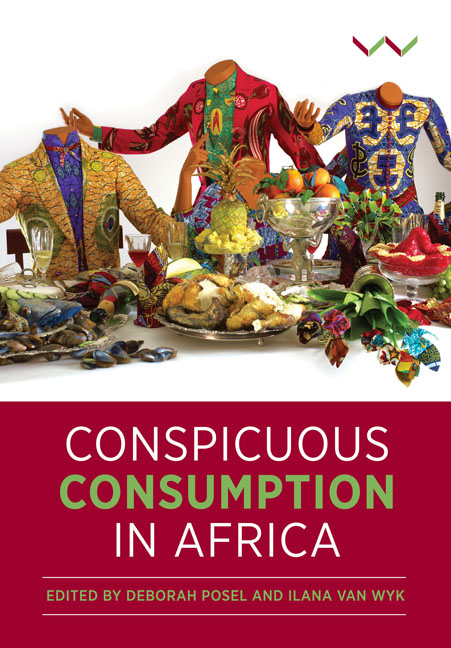Book contents
- Frontmatter
- Contents
- Acknowledgements
- List of Illustrations
- 1 Thinking With Veblen: Case Studies From Africa's Past and Present
- 2 Changes in the Order of Things: Department Stores and the Making of Modern Cape Town
- 3 Conspicuously Public: Gendered Histories of Sartorial and Social Success in Urban Togo
- 4 Etienne Rousseau, Broedertwis and the Politics of Consumption Within Afrikanerdom
- 5 Recycling Consumption: Political Power and Elite Wealth in Angola
- 6 Chiluba's Trunks: Consumption, Excess and the Body Politic in Zambia
- 7 Jacob Zuma's Shamelessness: Conspicuous Consumption, Politics and Religion
- 8 Precarious ‘Bigness’: a ‘Big Man’, His Women and His Funeral in Cameroon
- 9 Young Men of Leisure? Youth, Conspicuous Consumption and the Performativity of Dress in Niger
- 10 Booty on Fire: Looking at Izikhothane With Thorstein Veblen
- 11 Conspicuous Queer Consumption: Emulation and Honour in the Pink Map
- 12 The Politics and Moral Economy of Middle-Class Consumption in South Africa
- 13 Marigold Beads: Who Needs Diamonds?!
- Contributors
- Index
9 - Young Men of Leisure? Youth, Conspicuous Consumption and the Performativity of Dress in Niger
Published online by Cambridge University Press: 29 October 2019
- Frontmatter
- Contents
- Acknowledgements
- List of Illustrations
- 1 Thinking With Veblen: Case Studies From Africa's Past and Present
- 2 Changes in the Order of Things: Department Stores and the Making of Modern Cape Town
- 3 Conspicuously Public: Gendered Histories of Sartorial and Social Success in Urban Togo
- 4 Etienne Rousseau, Broedertwis and the Politics of Consumption Within Afrikanerdom
- 5 Recycling Consumption: Political Power and Elite Wealth in Angola
- 6 Chiluba's Trunks: Consumption, Excess and the Body Politic in Zambia
- 7 Jacob Zuma's Shamelessness: Conspicuous Consumption, Politics and Religion
- 8 Precarious ‘Bigness’: a ‘Big Man’, His Women and His Funeral in Cameroon
- 9 Young Men of Leisure? Youth, Conspicuous Consumption and the Performativity of Dress in Niger
- 10 Booty on Fire: Looking at Izikhothane With Thorstein Veblen
- 11 Conspicuous Queer Consumption: Emulation and Honour in the Pink Map
- 12 The Politics and Moral Economy of Middle-Class Consumption in South Africa
- 13 Marigold Beads: Who Needs Diamonds?!
- Contributors
- Index
Summary
When we were young, we would spend a lot of money’, Moustapha, a 20-something- year-old nursing student, said to me as he watched his adversary roll the dice and move one of his chequers across the backgammon board. We were sitting at the entrance of Moustapha's family home in Lamordé, a former village on the edge of the Niger River that has since been absorbed into Niamey, Niger's capital city. The sun was slowly setting into the hazy horizon. It was time for the mangariba prayer (Hausa equivalent of the Arabic maghrib; one of the five prayers Muslims perform daily). Two young men sitting next to the players were making their ablutions, pouring water from a plastic kettle, in preparation for worship. The air around us was thick with the smoke of women's cooking fires and the dust raised by young boys running after a deflated soccer ball just up the street. Absorbed in their game, neither player gave any sign that they had heard the muezzin's call to prayer. Moustapha rolled the dice and moved his pawn swiftly across the board. Then he turned to me:
We'd have dance parties. We'd go to nightclubs, we'd go to la pilule. On gaspillait beaucoup d'argent [we wasted a lot of money]. Now we're more mature, we don't want to waste money that way. We're thinking about marriage, we want to get married, have a family, buy a house and have a nice life. We must leave behind this life of waste we used to lead.
Moustapha was alluding to his younger days, when he and his friends, all members of the Titanic fada (conversation group or ‘tea circle’), met every evening to listen to popular music, drink tea and plan their next evening of wild fun. Fadas unite samari (young men) who have grown up in the same neighborhood or attended the same school. They constitute a refuge from formal social constraints and function with their own moral codes, ethics of accumulation and expenditure, and their own pathways to self-fashioning.
At the fada un(der)employed young urbanites, whose daily lives are overshadowed by uncertainty, can unburden themselves away from parental pressures and, as one of them once put it, ‘enjoy [their] youth while [they] can’.
- Type
- Chapter
- Information
- Conspicuous Consumption in Africa , pp. 150 - 167Publisher: Wits University PressPrint publication year: 2019



